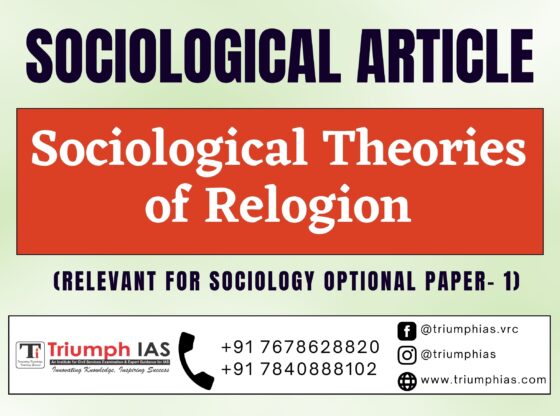Sociological Theories of Religion
Relevant for sociology optional Paper- 1 (Unit- 8 : Sociology- Religion & Society)
Sociological theories of religion have been a topic of interest for scholars and researchers for decades. These theories attempt to explain the role of religion in society, how it is used by individuals and groups, and how it influences social behaviour and attitudes. In this essay, we will explore some of the most important sociological theories of religion and their relevance in today’s society.
One of the most influential sociological theories of religion is the functionalist theory. According to this theory, religion plays a crucial role in maintaining social order and stability. It provides individuals with a sense of purpose and meaning in life, which helps them to cope with the challenges of everyday living. Religion also serves as a means of social control, as it reinforces moral values and norms, which are essential for maintaining a harmonious society.
Another important sociological theory of religion is the conflict theory. This theory posits that religion is a source of conflict in society, as it reinforces power imbalances and perpetuates social inequality. According to this theory, religion is often used by the ruling elite to maintain their dominance over the lower classes. This can be seen in the way that certain religious beliefs and practices are used to justify the unequal distribution of wealth and resources.
A third sociological theory of religion is the symbolic interactionist theory. This theory emphasizes the role of symbols and rituals in shaping our social reality. According to this theory, religion is not just a set of beliefs and practices, but a way of creating and reinforcing social meanings. Religious symbols and rituals provide individuals with a sense of identity and belonging, and help to define social relationships and hierarchies.
In addition to these three major sociological theories of religion, there are also other theories that seek to explain the role of religion in society. For example, the feminist theory emphasizes the ways in which religion reinforces gender inequalities and patriarchal power structures. The postmodernist theory, on the other hand, challenges the idea of a universal truth and argues that religion is just one of many ways in which individuals construct their reality.
The sociological theories of religion have important implications for understanding contemporary religious movements and trends. For example, the rise of fundamentalism in many parts of the world can be seen as a response to the perceived threat to traditional values and social norms. Similarly, the increasing secularization of many societies can be seen as a result of the changing social and economic conditions, which have made religion less relevant to people’s everyday lives.
In India, religion has played a significant role in shaping the social, cultural, and political landscape of the country. The Hindu religion, in particular, has been a major force in Indian society for thousands of years. The functionalist theory of religion can be applied to the Indian context, as religion has played a crucial role in maintaining social order and stability. The caste system, for example, is a product of religious beliefs and practices, and has been used to justify social inequalities for centuries.
The conflict theory of religion is also relevant to the Indian context, as religion has been used to justify social inequalities and perpetuate power imbalances. The caste system, for example, has been used to maintain the dominance of the upper castes over the lower castes. Similarly, the rise of Hindu nationalism in recent years can be seen as a response to the perceived threat to traditional Hindu values and social norms.
The symbolic interactionist theory of religion is also relevant to the Indian context, as religion plays a crucial role in shaping social identities and relationships. Religious symbols and rituals provide individuals with a sense of identity and belonging, and help to define social relationships and hierarchies. For example, the wearing of the bindi and the mangalsutra are important symbols of Hindu identity and marriage, respectively.
In conclusion, the sociological theories of religion provide a useful framework for understanding the role of religion in society and its influence on social behaviour and attitudes. These theories have important implications for understanding contemporary religious trends and movements, and can be applied to the Indian context to shed light on the role of religion in shaping the social, cultural, and political landscape of the country. By studying the sociological theories of religion, we can gain a deeper understanding of how religion influences individuals and society as a whole, and how it can be used to maintain social order and stability, or perpetuate social inequalities and power imbalances.
For more such notes, Articles, News & Views Join our Telegram Channel. https://t.me/triumphias
Click the link below to see the details about the UPSC – Civils courses offered by Triumph IAS. https://triumphias.com/pages-all-courses.php


